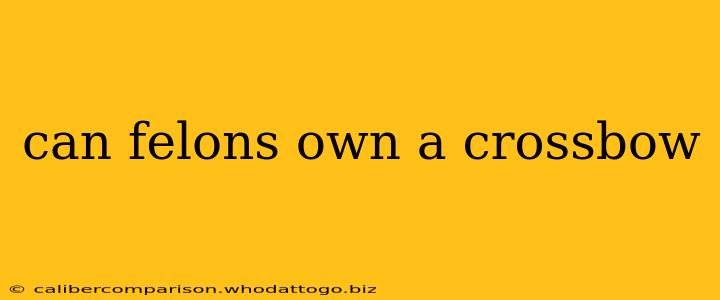The question of whether felons can own a crossbow is not straightforward. While crossbows aren't explicitly named in many federal firearm laws, their legal status often hinges on state-specific regulations and the nature of the felony conviction. This nuanced situation requires careful examination of both federal and state laws.
Federal Regulations and the Definition of "Firearm"
Federal law, primarily focusing on firearms, generally defines a firearm as a weapon designed to expel a projectile through an explosive propellant. Since crossbows propel projectiles using mechanical force rather than explosives, they typically fall outside the purview of federal firearm restrictions. This doesn't automatically grant felons the right to own one, however.
State-Specific Laws: The Key Determinant
The legality of crossbow ownership for felons significantly depends on individual state laws. Many states have laws prohibiting convicted felons from possessing any weapon, regardless of whether it's technically a firearm under federal law. These laws often broadly define "weapons" to include items capable of causing serious injury or death. Crossbows, clearly fitting this description, would likely be included in such prohibitions.
Other states may have more nuanced regulations. They might permit crossbow ownership for certain non-violent felonies or after a period of time following the completion of a sentence. Some states might also have specific licensing requirements for crossbow ownership, regardless of felony status. These licenses may be unavailable to convicted felons.
Understanding the Variations
The specific details of state laws vary widely:
- Complete Prohibition: Some states explicitly ban felons from owning any type of weapon, including crossbows.
- Conditional Permission: Other states might allow crossbow ownership if certain conditions are met (e.g., completion of probation, specific types of felonies excluded).
- Silent Legislation: In some cases, state law might not explicitly address crossbow ownership by felons, creating legal ambiguity. In these situations, interpretation by law enforcement and the courts becomes crucial.
The Impact of the Felony Conviction
The type of felony conviction plays a significant role. Violent felonies are far more likely to result in a permanent ban on weapon possession, including crossbows, than non-violent offenses. The specifics of the conviction and any associated court orders are paramount.
Seeking Legal Counsel: The Safest Approach
Given the complexity and variability of state and local laws, it's crucial for any felon considering crossbow ownership to seek legal counsel. An attorney specializing in firearms law can provide accurate and personalized guidance based on the individual's specific circumstances, including their state of residence and the nature of their felony conviction. Ignoring this advice could lead to serious legal consequences.
Disclaimer: This information is for educational purposes only and does not constitute legal advice. Consult with a legal professional for guidance on your specific situation.
This comprehensive guide provides a thorough overview, taking into account federal regulations, state-level variations, and the crucial role of the felony conviction itself. The emphasis on seeking legal counsel underscores the importance of responsible and informed decision-making in this area. Remember, the consequences of violating weapons laws can be severe.

